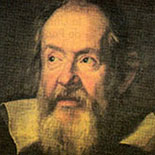 Galileo Galilei (February 15, 1564 – January 8, 1642), often known mononymously as Galileo, was an Italian physicist, mathematician, astronomer, and philosopher who played a major role in the scientific revolution. His achievements include improvements to the telescope and consequent astronomical observations and support for Copernicanism. Galileo has been called the “father of modern observational astronomy”, the “father of modern physics”, the “father of science”, and “the Father of Modern Science”.
Galileo Galilei (February 15, 1564 – January 8, 1642), often known mononymously as Galileo, was an Italian physicist, mathematician, astronomer, and philosopher who played a major role in the scientific revolution. His achievements include improvements to the telescope and consequent astronomical observations and support for Copernicanism. Galileo has been called the “father of modern observational astronomy”, the “father of modern physics”, the “father of science”, and “the Father of Modern Science”.
His contributions to observational astronomy include the telescopic confirmation of the phases of Venus, the discovery of the four largest satellites of Jupiter (named the Galilean moons in his honor), and the observation and analysis of sunspots. Galileo also worked in applied science and technology, inventing an improved military compass and other instruments.
Galileo’s championing of heliocentrism was controversial within his lifetime, when most subscribed to either geocentrism or the Tychonic system. He met with opposition from astronomers, who doubted heliocentrism due to the absence of an observed stellar parallax. The matter was investigated by the Roman Inquisition in 1615, which concluded that heliocentrism was false and contrary to scripture, placing works advocating the Copernican system on the index of banned books and forbidding Galileo from advocating heliocentrism. Galileo later defended his views in Dialogue Concerning the Two Chief World Systems, which appeared to attack Pope Urban VIII and thus alienated him and the Jesuits, who had both supported Galileo up until this point. He was tried by the Holy Office, then found “vehemently suspect of heresy”, was forced to recant, and spent the rest of his life under house arrest. It was while Galileo was under house arrest that he wrote one of his finest works, Two New Sciences, in which he summarized the work he had done some forty years earlier, on the two sciences now called kinematics and strength of materials.
Albert Einstein called him the father of modern science.